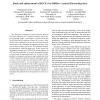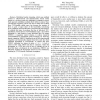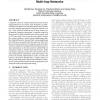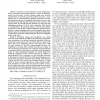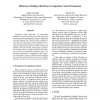135
Voted
ECUMN
2007
Springer
15 years 7 months ago
2007
Springer
The Datagram Congestion Control Protocol (DCCP) has been proposed as a transport protocol which supports real-time traffic. In this paper, we focus on the use of DCCP/CCID3 (Cong...
IPPS
2007
IEEE
15 years 7 months ago
2007
IEEE
Many modern massively distributed systems deploy thousands of nodes to cooperate on a computation task. Network congestions occur in these systems. Most applications rely on conge...
96
Voted
INFOCOM
2007
IEEE
15 years 7 months ago
2007
IEEE
— Distributed media streaming, which uses multiple senders to collaboratively and simultaneously stream media content to a receiver, poses new challenges in congestion control. S...
88
Voted
ICC
2007
IEEE
15 years 7 months ago
2007
IEEE
— The potential problem of oversubscribing receivers in receiver-driven multicast is addressed. We present a framework based on harmonizing the erasure-resilience properties of v...
96
Voted
ICC
2007
IEEE
15 years 7 months ago
2007
IEEE
— The Datagram Congestion Control Protocol (DCCP) is a new IETF-defined transport protocol for Internet multimedia. The DCCP Congestion Control Identifier 4 (CCID4) was speci�...
106
Voted
SECON
2008
IEEE
15 years 7 months ago
2008
IEEE
— We address the problem of congestion control in multi-radio, multi-channel, wireless mesh networks. Compared to its single radio counterpart for which solutions exist, this pro...
113
click to vote
SECON
2008
IEEE
15 years 7 months ago
2008
IEEE
Congestion control in wireless multi-hop networks is challenging because of two reasons. First, broadcast is an inherent feature of wireless networks and motivates many creative p...
120
Voted
INFOCOM
2008
IEEE
15 years 7 months ago
2008
IEEE
— Load factor based congestion control schemes have shown to enhance network performance, in terms of utilization, packet loss and delay. In these schemes, using more accurate re...
INFOCOM
2008
IEEE
15 years 7 months ago
2008
IEEE
— In this paper we study the problem of jointly performing scheduling and congestion control in mobile adhoc networks so that network queues remain bounded and the resulting flo...
92
Voted
ICNS
2008
IEEE
15 years 7 months ago
2008
IEEE
Congestion control algorithms are traditionally evaluated in contrast to ideal capacity allocations that specify instantaneous efficient fair rates for application sessions but i...
